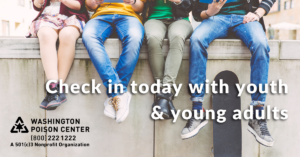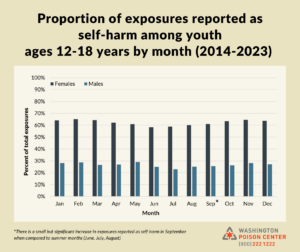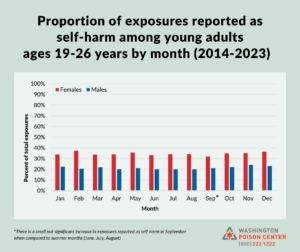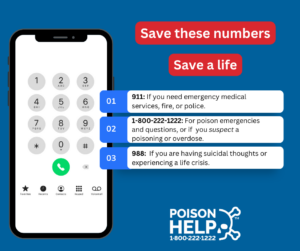
September was back to school for youth and college students in Washington. We’re paying close attention as we move into October, as we oftentimes see an increase in self-harm related poisonings in the fall. Back to school is a period of increased stress, anxiety, and emotional pressure. Students face academic challenges, social anxieties, and abrupt changes in routine, all of which can be overwhelming.
We took a look at our calls from youth and young adults over the last 10 years to see what’s been happening in Washington:


There are three main takeaways:
1. When we look at all of the reasons why youth and young adults call us, seeking help after self-harm is the second most common reason. This is different than other age groups, in which we usually help after accidents with harmful substances or medication mistakes. This means we all need to recognize the warning signs that a youth or young adult may be thinking of suicide:
- Withdrawing from friends and family
- Increased substance use or other high-risk behaviors
- Talking about feeling empty, hopeless, or being a burden
- Giving away important possessions
- Researching ways to kill themselves
If someone in your life is showing any of these warning signs, ask them if they are thinking about killing themselves. Asking someone if they’re thinking about suicide does NOT put the idea in their head or increase their risk of attempting suicide. In fact, research shows that openly asking about suicidal thoughts can reduce risk because it provides an opportunity for the person to express their feelings, feel understood, and access help. Help them connect to support, including calling the Suicide & Crisis Lifeline at 988.
2. We do see a small (but significant) increase in self-harm poisonings in September and through the winter. This means now is an especially important time to check in with the youth and young adults in your lives. Take note of any changes in their mood or behavior, engage them in discussion on their lives and mental health, and seek help if any warning signs appear.
3. Self-harm by poisoning is much more common in female youth and young adults than males. This isn’t to say that it’s less important to pay attention to the male youth and young adults in your lives — different genders tend to utilize different means of self-harm and attempted suicide. While it’s impossible to eliminate all risks, you can help prevent self-harm and suicide by limiting access to common risks:
- Lock up all over-the-counter and prescription medications. Use a medication lockbox, a locking toolbox, a safe, or any other secured storage area. If locking up all medication is too challenging, keep a small quantity out (for example, one week’s supply) and lock up the rest.
- Dispose of any expired, unused, or unneeded medications. In Washington, we have many locations all around the state that will dispose of your medications for free every day. Find a secure medicine return location near you at https://medtakebackwashington.org/
- Store guns unloaded and locked up.
- Store toxic cleaners, pesticides, and chemicals in a locked cupboard.

